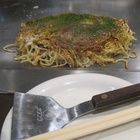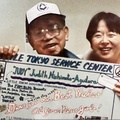We are sitting in a restaurant in Battery Park, which is on the south side of the island of Manhattan.
Morgan tells me that it is a new restaurant that opened a few months ago. Apparently restaurants open and close in America all the time. I don’t know if he’s telling me this as a cautionary tale. But I won’t be discouraged. Red Okonomiyaki and I will make it in New York City.
I try to order modestly. Yes, I’m holding back. Since this was Morgan’s invitation, I’m assuming that he will be paying. So instead of the duck foie gras, I order the Caesar salad and the house wine. I lie and tell him that I have eaten a big lunch.
I do order dessert, something that I’ve never heard of. Tres leches cake. It is sweet and lavish, soaked in milk. It’s how I imagine American desserts to taste.
“I like what you’re wearing,” he says, all of a sudden, as he sips his cappuccino.
It’s actually something Rumi’s lent me. I’m usually more of a jeans girl, but I’m wearing her dress. It’s black and simple and a little too low cut than I’m used to.
I blush a little and take another bite of my cake.
Morgan is actually easy to talk to. I expect him to be obsessed with his cell phone, but he only looks at it once in the beginning of our date and probably only while I was in the restroom.
I don’t mention anything about my horrible uncle and how he has kicked me out of the family business in Hiroshima. I don’t talk about my bad break-up with Makoto. And, of course, nothing about my dead parents. Instead we talk about New York and the best places to eat Ethiopian food (I’ve never had it), what musicals to check out, the art museums.
New York City will be my playground for who knows how long and I want to take advantage of everything it has to offer.
When the bill comes, it’s a bit awkward. I pull out my purse and he shakes his head.
“What do you think you’re doing?” he says as he places his gold American Express card in the check holder.
I haven’t felt like this for a long time. That someone is taking care of me. I’ve been struggling for so long. It feels good to relax and breathe for once.
As we walk out the glass door, he grabs my hand. “Let me show you something,” he says.
Normally, I won’t let a man whom I barely know hold my hand, but I go along with it. I’m in America now.
We walk down some streets and then he finally points to something in the distance in the bay.
“That is not…”
“It is. Lady Liberty.”
The Statue of Liberty is still far away. It’s lit and I can barely see her outstretched arm, but there is the smudge of light from her torch. My heart starts pounding. It’s strange how emotional it is for me to see the statue in person, even if it is from a distance. I had watched an NHK television program about it. It was a gift from France and came with the message, “Give me your tired, your poor, your huddled masses yearning to breath free.” Well, I am feeling pretty tired and poor right now. And I want to be free.
I feel Morgan’s hand around my waist and I turn to him. He has beautiful eyes, eyes framed with such heavy lashes.
Before I know it, we are kissing. He doesn’t kiss like Makoto, who, quite honestly, was like a sucking carp sometimes. Morgan instead kisses gently, like he is enjoying the taste of my lips. I don’t know how long we are doing this. All I know is that I’m falling, I’m falling.
“Come to my place,” he whispers in my ear. “My apartment is not far from here.”
I shake my head.
“What? C’mon? What are you afraid of?”
“I am not afraid,” I tell him.
He hails a cab and I go in.
*****
The next morning, I don’t quite know where I am. My back is not hurting from sleeping on Risa’s floor. I’m lying on a mattress, and a massive one at that.
The spring sun is shining brightly in my eyes through the wooden slats of his Venetian blinds. His eleventh-floor apartment is much larger than Risa’s. It has a proper bedroom and a row of windows on one side of the room.
I’m totally hadaka, without a stitch of clothing. I wrap a sheet around me and sit up. My dress and underwear are still on the floor. I remember what we did last night. It’s true what they say. American men work very fast.
Morgan enters the bedroom. He’s already dressed in a crisp white shirt and is adjusting his tie. He sees that I’m up and smiles. “Morning.”
“Ohayo.” I suddenly feel shy.
“Here,” he says, pulling a fresh white T-shirt from a drawer, “go ahead and wear this for now.”
I pull it on and follow him into the bathroom. He points to one of the drawers, which I open. A stash of new toothbrushes still in their packaging. On the counter is an electric toothbrush, which I’m assuming is his. Are all these toothbrushes for his impromptu guests? Guests who happen to be female?
He takes a call on his cell, while I take a shower. Afterwards, I get back into Rumi’s black dress. I need to go back to her place.
His living room also has a row of windows on the west side. He’s opened the curtains and there she is again, the Statue of Liberty, emerging out of the mist.
“I will see you later today then,” I hand him his T-shirt, neatly folded.
He lifts his eyebrows.
“Our meeting. For my restaurant loan.”
“Oh, yeah, that.” He slips his phone in his pocket. “I’m just not sure if it will all work out.”
“What?” Am I not understanding?
“Well, you know the way our country—well, America—is going right now, it’s going to be real hard to give a loan to a foreigner with a small business.”
“You never said that. You did not say this last night.”
“I didn’t really know. Actually I just got a text from my office right now. Everything is changing so fast, we don’t know what is going on.”
I can’t believe what I’m hearing. Is he telling me the truth? Or did he know that I wasn’t eligible for the loan this whole time?
“Kaori, some of it is just common sense. What happens to your restaurant if you are deported for some reason? Or go to Japan to buy supplies and then are not allowed back into the country? Since this concept is so specialized, it’s not like someone else can easily take over.”
“But I have my visa.”
Morgan stares at me. His eyes don’t look as beautiful as last night. In fact, they look cold and menacing. “You know that anything can still change.”
I grab my purse. “What about her?” I say before I leave.
“Who?”
I point to the window. “Missus Liberty.”
“You’re not poor or oppressed.”
“How do you know that?” Hot tears come to my eyes. “We believe in America.” President Obama had come to Hiroshima last year and everyone in our city—no, our country—was so elated, happy. Books about his visit were sold all over Japan. The origami cranes that he folded for Hiroshima were on display at the Peace Park for months.
When I considered making a new start, I knew of only one place, America. In Japan, there are limits based on who your family is, where you come from. And if you are female, it’s even tougher. “I thought America was a place to have a second chance,” I say.
“Kaori, you still have a lot to learn,” Morgan says. “It’s nice in principle, but sometimes they are just that. Words.”
© 2017 Naomi Hirahara





